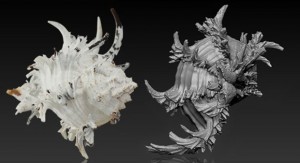What is often touted as the most valuable asset London holds for burgeoning tech industry is it’s mix of technical expertise and artistic ability pouring out of its many universities. The emerging tech scene is thriving on creative graduates as much as it is does on the coders and software engineers. History tells us however, that engineers and artist don’t always work well together, and technology often tends to accentuate the rift rather than reduce it, as the abstract challenges associated with writing functioning code don’t always allow creative types to realise their vision.
Thankfully, new forms of imaging and modelling are being developed on the software engineering side so the artists of the world don’t have to learn Java. Although 3D printing is currently the most visible of these, possibly an equally enabling technology is that of digitisation and 3D scanning which allows real world objects to be mapped into software. As developed by businesses such as Shoreditch based Inition, this type of imaging is currently limited to fairly small and simple objects with the most complexed being a human head, but as the software evolves professional grade high resolution cameras could be used to capture entire rooms.
With the very real possibility of building a ‘stock library’ of digitised assets, the most obvious applications are in CGI film making and game development, however this could also assist programmers of augmented reality tech in allowing their hardware to more swiftly recognise the world they are presented with. Google glass would have a much broader scope if it could identify entire groups of objects or scenes by cross referencing them with the database in the cloud, or even add to the library yourself simply by looking at an artifact and saying something awkward like ‘OK Glass, Digitise’.
Combined with advanced motion capture, virtual reality headsets and 3D printing, these technologies represent a renaissance of creative computing in which the designers themselves need little knowledge of programming, and London could very possibly be at it’s forefront, breaking into larger markets than app development and web design. Could an art degree lead straight into a job doing set design for a digitally animated film? Surely, the increasing accessibility of creative computing is going to promote a decentralisation from silicon valley, and London appears to be it’s next capital.





